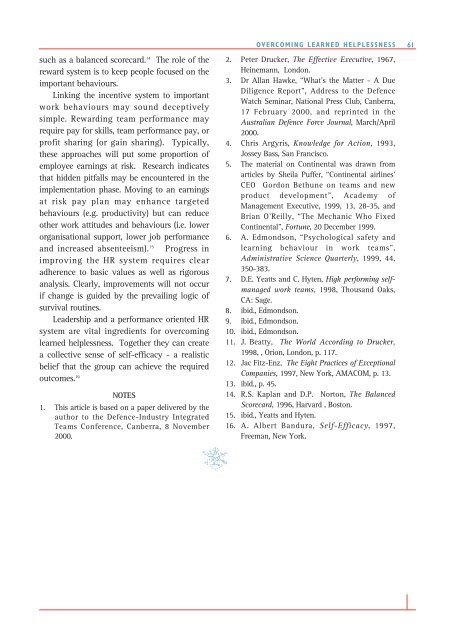ISSUE 150 : Sep/Oct - 2001 - Australian Defence Force Journal
ISSUE 150 : Sep/Oct - 2001 - Australian Defence Force Journal
ISSUE 150 : Sep/Oct - 2001 - Australian Defence Force Journal
You also want an ePaper? Increase the reach of your titles
YUMPU automatically turns print PDFs into web optimized ePapers that Google loves.
such as a balanced scorecard. 14 The role of thereward system is to keep people focused on theimportant behaviours.Linking the incentive system to importantwork behaviours may sound deceptivelysimple. Rewarding team performance mayrequire pay for skills, team performance pay, orprofit sharing (or gain sharing). Typically,these approaches will put some proportion ofemployee earnings at risk. Research indicatesthat hidden pitfalls may be encountered in theimplementation phase. Moving to an earningsat risk pay plan may enhance targetedbehaviours (e.g. productivity) but can reduceother work attitudes and behaviours (i.e. lowerorganisational support, lower job performanceand increased absenteeism). 15 Progress inimproving the HR system requires clearadherence to basic values as well as rigorousanalysis. Clearly, improvements will not occurif change is guided by the prevailing logic ofsurvival routines.Leadership and a performance oriented HRsystem are vital ingredients for overcominglearned helplessness. Together they can createa collective sense of self-efficacy - a realisticbelief that the group can achieve the requiredoutcomes. 16NOTES1. This article is based on a paper delivered by theauthor to the <strong>Defence</strong>-Industry IntegratedTeams Conference, Canberra, 8 November2000.OVERCOMING LEARNED HELPLESSNESS 612. Peter Drucker, The Effective Executive, 1967,Heinemann, London.3. Dr Allan Hawke, “What’s the Matter - A DueDiligence Report”, Address to the <strong>Defence</strong>Watch Seminar, National Press Club, Canberra,17 February 2000, and reprinted in the<strong>Australian</strong> <strong>Defence</strong> <strong>Force</strong> <strong>Journal</strong>, March/April2000.4. Chris Argyris, Knowledge for Action, 1993,Jossey Bass, San Francisco.5. The material on Continental was drawn fromarticles by Sheila Puffer, “Continental airlines’CEO Gordon Bethune on teams and newproduct development”, Academy ofManagement Executive, 1999, 13, 28-35, andBrian O’Reilly, “The Mechanic Who FixedContinental”, Fortune, 20 December 1999.6. A. Edmondson, “Psychological safety andlearning behaviour in work teams”,Administrative Science Quarterly, 1999, 44,350-383.7. D.E. Yeatts and C. Hyten, High performing selfmanagedwork teams, 1998, Thousand Oaks,CA: Sage.8. ibid., Edmondson.9. ibid., Edmondson.10. ibid., Edmondson.11. J. Beatty, The World According to Drucker,1998, , Orion, London, p. 117.12. Jac Fitz-Enz, The Eight Practices of ExceptionalCompanies, 1997, New York, AMACOM, p. 13.13. ibid., p. 45.14. R.S. Kaplan and D.P. Norton, The BalancedScorecard, 1996, Harvard , Boston.15. ibid., Yeatts and Hyten.16. A. Albert Bandura, Self-Efficacy, 1997,Freeman, New York.
















